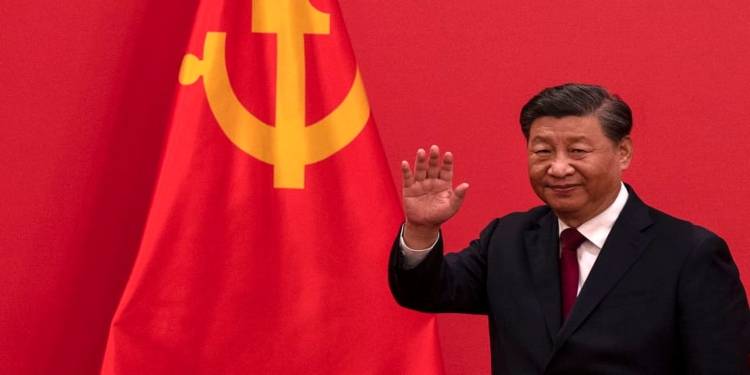
Xi Jinping on Friday secured a precedent-breaking third five-year term as China's president as he tightens his grip as the country's most powerful leader since Mao Zedong.
Nearly 3,000 members of China's parliament, the National People's Congress (NPC), voted unanimously in the Great Hall of the People for Xi, 69, to be president in an election where there was no other candidate.
The voting lasted for about an hour and the electronic counting was completed in about 15 minutes.
The stage was set for another Xi term when he did away with presidential term limits in 2018. His power was already extended last October when he was reconfirmed for another five years as general secretary of the central committee of the ruling Communist Party.
Over the next two days, officials approved by Xi are set to be appointed or elected to fill top positions in the cabinet, including premier-in-waiting Li Qiang, who is expected to be named to China's No.2 post, putting him in charge of managing the world's second-largest economy.
The election of state leaders by the parliament comes three months after tough COVID-19 policies were dismantled and a new wave of infections caused by the highly transmissible Omicron strain rippled across the country. Except for dozens of top leaders, all other delegates and staff wore masks.
For decades, China — scarred by the dictatorial reign and cult of personality of founding leader Mao Zedong — eschewed one-man rule in favor of a more consensus-based, but still autocratic, leadership.
That model imposed term limits on the largely ceremonial role of the presidency, with Xi's predecessors Jiang Zemin and Hu Jintao relinquishing power after 10 years in office.
Xi has torn up that rulebook, abolishing term limits in 2018 and allowing a cult of personality to foster his all-powerful leadership.
But the beginning of his unprecedented third term comes as the world's second-largest economy faces major headwinds, from slowing growth and a troubled real estate sector to a declining birth rate.
Relations with the United States are also at a low not seen in decades, with the powers sparring over everything from human rights to trade and technology.
"We will see a China more assertive on the global stage, insisting its narrative to be accepted," Steve Tsang, director of the SOAS China Institute, told AFP.
"But it is also one that will focus on domestically making it less dependent on the rest of the world, and making the Communist Party the centrepiece of governance, rather than the Chinese government," he said.
"It is not a return to the Maoist era, but one that Maoists will feel comfortable in," Tsang added.
"Not a direction of travel that is good for the rest of the world."
Nearly 3,000 members of China's parliament, the National People's Congress (NPC), voted unanimously in the Great Hall of the People for Xi, 69, to be president in an election where there was no other candidate.
The voting lasted for about an hour and the electronic counting was completed in about 15 minutes.
The stage was set for another Xi term when he did away with presidential term limits in 2018. His power was already extended last October when he was reconfirmed for another five years as general secretary of the central committee of the ruling Communist Party.
Over the next two days, officials approved by Xi are set to be appointed or elected to fill top positions in the cabinet, including premier-in-waiting Li Qiang, who is expected to be named to China's No.2 post, putting him in charge of managing the world's second-largest economy.
The election of state leaders by the parliament comes three months after tough COVID-19 policies were dismantled and a new wave of infections caused by the highly transmissible Omicron strain rippled across the country. Except for dozens of top leaders, all other delegates and staff wore masks.
For decades, China — scarred by the dictatorial reign and cult of personality of founding leader Mao Zedong — eschewed one-man rule in favor of a more consensus-based, but still autocratic, leadership.
That model imposed term limits on the largely ceremonial role of the presidency, with Xi's predecessors Jiang Zemin and Hu Jintao relinquishing power after 10 years in office.
Xi has torn up that rulebook, abolishing term limits in 2018 and allowing a cult of personality to foster his all-powerful leadership.
But the beginning of his unprecedented third term comes as the world's second-largest economy faces major headwinds, from slowing growth and a troubled real estate sector to a declining birth rate.
Relations with the United States are also at a low not seen in decades, with the powers sparring over everything from human rights to trade and technology.
"We will see a China more assertive on the global stage, insisting its narrative to be accepted," Steve Tsang, director of the SOAS China Institute, told AFP.
"But it is also one that will focus on domestically making it less dependent on the rest of the world, and making the Communist Party the centrepiece of governance, rather than the Chinese government," he said.
"It is not a return to the Maoist era, but one that Maoists will feel comfortable in," Tsang added.
"Not a direction of travel that is good for the rest of the world."

